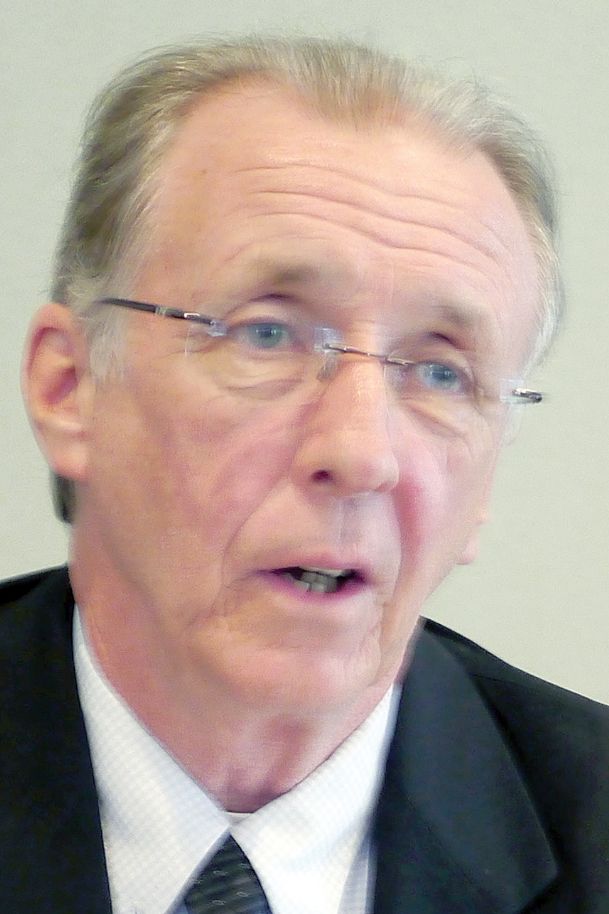Although state insurance commissioner Mike Chaney was unable to attend a Tuesday meeting with the Columbus Rotary Club, his proxy, former Commercial Dispatch editor and current insurance department spokesperson, Joseph Ammerman had some harsh words for Gov. Phil Bryant for his role in the federal government’s decision to reject Chaney’s state-run health insurance exchange.
“I have two words for why the exchange failed,” Ammerman said. “Phil Bryant.”
Last week, federal officials rejected Chaney’s application for a state-run exchange because of a disagreement between the insurance commissioner and Gov. Bryant over the plan. Bryant had sought to block Chaney’s plan by arguing that the state’s constitution limited that power to the governor alone. Bryant has stated he will not set up a state exchange, presumably in an effort to fight implementation of the Patient Protection Affordable Care Act in Mississippi. Although himself opposed to the Affordable Care Act, Chaney said it was his responsibility to set up the exchange in an effort to provide Mississippians with the best health-care options available.
Under the Affordable Care Act, any state that chooses not to set up its own health insurance exchange would have an exchange set up by the federal government.
Chaney was told there still exists another option, a health care exchange that would be a joint effort by the state and federal government.
“The insurance exchange is not a Democrat or Republican thing, but we think Gov. Bryant listens a lot to the Republican Governor’s Association,” Ammerman said. “If they fight Obamacare, we all fight it. The Affordable Care Act, commonly called Obamacare is not going away. Even Mitt Romney said if he was elected he couldn’t repeal Obamacare because he wouldn’t have the votes. We think Gov. Bryant hasn’t thought this through. If you don’t want Obamacare, why would you want the federal government to come in and run the insurance exchange?”
In a letter to Chaney last week, the feds blamed Bryant for the failure of the plan.
“There is no feasible pathway to approving a state-based marketplace in Mississippi for 2014 without support from Gov. Bryant and agreements to coordinate with other state agencies,” wrote Gary Cohen, director of the Centers for Medicare and Medicaid Services’ Center for Consumer Information and Insurance Oversight in the letter.
Ammermen characterized a health care exchange as a “Travelocity for insurance.” Those seeking health insurance would go to mshie.org and enter the amount they would like to pay monthly for health insurance. The customer could then look at a number of options before purchasing a plan online.
“It allows you to select plans in your price range,” Ammerman said.
The Associated Press said states that don’t form their own marketplace will have one run by the federal government starting Oct. 1, with coverage effective Jan. 1, 2014. The marketplaces are a key component of the federal health law to expand coverage to millions of people starting next year.
Ammerman said Bryant’s intransigence may prove costly.
“We think Gov. Bryant has cost us a lot of money, but we’ll know more on Oct. 1,” Ammerman said.
Bryant spokesperson Mick Bullock said the governor’s action will actually save Mississippians some money in the long run.
“From the outset, Gov. Bryant has stated his opposition to the health insurance exchanges mandated by Obamacare,” Bullock said. “While the governor is supportive of a free-market health insurance exchange that would aid small businesses and consumers, the ObamaCare exchanges–regardless of whether you label them ‘state-run’, ‘partnership’ or ‘federally run’–are not free-market systems at all. Instead, they are heavily regulated and are built upon a massive new federal entitlement program. These exchanges trigger new taxes on businesses and will ultimately drive more people onto Medicaid rolls. Why would Mississippi assume the costs and responsibilities of implementing a system that will harm our businesses and our state budget?”
Mississippi’s poverty rate is among the highest in the nation and the state consistently rates among the worst in a wide range of health care categories. Estimates are that as many as 300,000 uninsured Mississippians would be provided health care under an expanded Medicaid program that is part of the Affordable Care Act.
This story contains additional reporting by the Associated Press.
Jeff Clark was previously a reporter for The Dispatch.
You can help your community
Quality, in-depth journalism is essential to a healthy community. The Dispatch brings you the most complete reporting and insightful commentary in the Golden Triangle, but we need your help to continue our efforts. In the past week, our reporters have posted 37 articles to cdispatch.com. Please consider subscribing to our website for only $2.30 per week to help support local journalism and our community.







